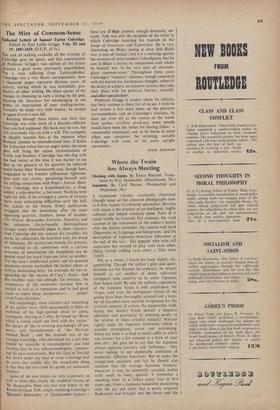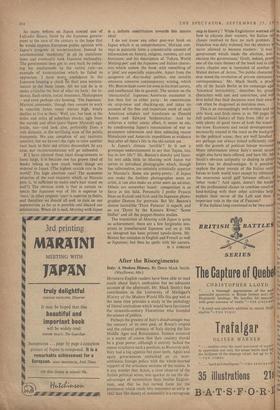Where the Twain Are Always Meeting
Meeting with Japan. By Fosco Maraini. Trans-
Nicholson, 50s.)
A HANDSOME volume, excellently illustrated (though some of the coloured photographs look as if they require bi-coloured spectacles), Meeting with Japan is the product of an intelligent, highly cultured and indeed scholarly mind. Parts of it could hardly be bettered. For instance, the vivid account of the internment of the author's family after the Italian surrender, the concise and lucid 'Digression on Language and Ideograms,' and the description of Japanese/American behaviour at the end of the war : 'like puppies who were still suspicious but wanted to play with each other, [they] started sniffing each 'other a little more closely. . .
Yet, as a whole, I found the book slightly dis- appointing. Though the author's gifts and quali- fications are far beyond the ordinary,, he reveals himself as yet another of those cultivated foreigners who contrive to be more Japanese than Japan itself. By now the aesthetic superio-rity. of the Japanese house is well established, the virtues (and even the ambiguous virtue) of the geisha have been thoroughly attested and a num- ber of travellers have secured recognition for the civilised amenity of o-furo, the honourable bath. Surely one doesn't brand oneself a hopeless philistine and provincial by pointing gently to the reverse of these _oriental medals? Maraini rightly lauds the Japanese bathroom, which is wooden throughout, warn, and welcoming, where our bath is 'a tiled or metal coffin in which you simmer for a few minutes in a brew of your
own dirt.' He goes on to say that the Japanese always separate lavatory and bathroom : 'they never indulge in our deplorable confusion of essentially different functions.' But to make the comparison complete and fair he should also mention that the average Japanese lavatory, wherever it may be nominally situated, makes itself smelt in every quarter. I remember a
touching letter in a Tokyo paper four or five years ago, from a Japanese housewife exclaiming over the joy and relief that a newly acquired flush-toilet had brought into her house and life. So many writers on Japan remind one of Lafcadio Hearn, hired by the Japanese govern- ment at the turn of the century in the hope that he would impress European public opinion with Japan's progress in westernisation. Instead he anathematised 'modernity' in all its manifesta- tions and eventually took Japanese nationality. The government then got its own back by reduc- ing his emoluments to the native rate—an example of easternisation which he failed to appreciate. I have everye confidence in the Japanese keeping a check On their own western- isation in the basic issues. All we can do is to make available the best of what we have : for in- stance, flush-toilets, social insurance, Shakespeare —and even perhaps city housing. 'The Japanese,' Maraini comments, 'though they consent to work in concrete boxes many storeys high, wisely decline to live in them.' Well, yes; but look at the miles and miles of suburban shacks, ugly from the outside and often (pace Signor Maraini) ugly inside, too—and look also, preferably from a safe distance, at the terrifying state of the public transports. We can complain of our inartistic comfort, but we haven't the right to refer another race back to their old artistic discomfort. In any case, our recommendations will go unheeded.
If I have allowed these local disagreements to loom large, it is because one has grown tired of books telling us how much better things are ordered in Japan. (The highest suicide rate in the world? The high abortion rate? The economic situation of the vast majority which, as Maraini puts it, 'is sufficient to make one's hair stand on end"?) The obvious truth is that in certain re- spects the Japanese way of life is superior to 'ours,' in other respects 'ours' is superior to theirs, and therefore we should all seek to pass on our superiorities as far as is possible and discard our inferiorities. When all is said, Meeting with Japan
is a definite contribution towards this remote ideal.
I do not know any other post-war book on Japan which is as comprehensive.' Maraini con- veys in palatable form a considerable amount of information on history, religion, customs, art and literature; and his description of 'Tokyo, World Melting-pot' and the Japanese and Italian charac- ters which endow the book with something of a 'plot' are especially enjoyable. Apart from the quagmire of day-to-day politics, one notable omission concerns contemporary writing, which Mr. Beaton finds room for even in his brief survey, and intellectual life in general. The section on the 'unsuccessful' Japanese/American encounter is less than fair to either party : he concentrates on strip-tease and shacking-up, and takes no account of the fine and important work of such American scholars and translators as Donald Keene and Edward Seidensticker. And he achieves a rather comic effect, it seems to me, by condemning Japan's renunciation of war as premature reformism and then adducing recent Himalayan and Antarctic expeditions as evidence that after all there's life in the old nation yet.
Is Japan's climate 'terrible"? Is it not a grotesque understatement to say that 'Japan, too, has its low life'? Mr. Beaton's sketchy and fanci- ful text adds little to Meeting with Japan but serves to introduce photographs which, though less informative, are certainly artistically superior to Maraines. Some are pretty-pretty : if Japan can make the feeblest photographer seem an artist, it can also make an artist seem an ad-man. Others are somewhat banal : competition is so fierce in this field. Personally I prefer Francis Haar on Kabuki and Noh, and the Japanese photo- grapher Domon for portraits. But Mr. Beaton's almost incredible 'Thaw Patterns' is superb, and so are 'Dyers by the Katsura River,' Scene Shifter' and all the puppet-theatre studies.
The translation of Meeting with Japan is quite an achievement; there are a few forgivable mis- prints in transliterated Japanese and on p. 106 an ideogram has been printed upside-down. Mr. Beaton has mistakes in English and French as well as Japanese; but then he spells with his camera.
D. J. ENRIGHT



































 Previous page
Previous page